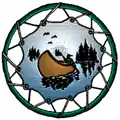Missinipi Broadcasting Corporation
Missinipi Broadcasting Corporation, or MBC Radio, is a radio network in Canada, serving First Nations and Métis communities in the province of Saskatchewan. The network's flagship station is CJLR in La Ronge.[1] MBC Radio broadcasts to more than 70 communities in Saskatchewan, including the major urban centres, and broadcasts a streaming audio feed over the Internet. MBC's current CEO is Deborah Charles, the first female CEO of an Indigenous radio broadcast network in Canada.[2]
 | |
| Broadcast area | Northern Saskatchewan |
|---|---|
| Frequency | Varies by location |
| Branding | MBC Radio |
| Programming | |
| Language(s) |
|
| Format | First Nations community radio |
| History | |
First air date | 1985 |
| Links | |
| Webcast | cjlr |
| Website | mbcradio |
History
Background
Starting in the 1960s, a provincial government radio service called Northern News, broadcasting from Prince Albert, was hosted by its first producer Helga Reydon. The program, a 15-minute weekly series, addressed issues and matters of interest for fishermen and trappers in the north. However, those broadcasts were plagued by poor reception and unequal signal distribution as they were broadcast on an AM radio station in the southern part of the province and had to "skip" into the north. The program also did not air content that was culturally specific to Indigenous peoples.
The provincial government realized its shortcomings in serving the northern citizens of Saskatchewan, and in 1973, the Department of Northern Saskatchewan (DNS) began producing a new Northern News program out of La Ronge. This program was hosted by producer/announcer Barrie Ward, with Indigenous-language content added by Cree and Michif linguists Tom Roberts and Robert Merasty. The new radio program added more northern content and significantly included major Indigenous-language content. The program, however, ended with the provincial government's disbanding of the DNS in 1982.
In the late 1970s, CBC Radio also began broadcasting a northern program, Keewatin Radio. The program contained some relevant northern content and was aided by better reception due to the installation of the low power FM relay transmitters in the north. The stories, though pertinent to the northern populace, were largely in English, and originated in Regina.
Formation
In 1983, the Government of Canada introduced the Northern Native Broadcast Access Program (NNBAP), funded and supported by the Department of Canadian Heritage. The NNBAP's aim was to enhance, protect and preserve Indigenous languages while at the same time allowing Indigenous peoples to control their own communications services.
In March 1984, a full-time coordinating committee was formed and Merasty was hired to gather information. A survey was conducted of the residents of northern Saskatchewan, the results of which gave the organizers a better idea of what Indigenous people wanted to hear on radio. Following the survey, the Missinipi Broadcasting Corporation's first board of directors was elected in 1984, with Merasty as the first CEO. The corporation implemented a basic radio skills training program in 1984 that was delivered through the local community college. The first MBC broadcast took place in February 1985 with Tom Roberts as host.
MBC's initial broadcasts were predominantly in English, with some Cree. A more advanced training program was launched at CJLR (La Ronge) in 1986. A strong focus was placed on expanding the use of Indigenous languages and the technical skills of its broadcast staff.
Improvements and expansion
During its formative years MBC was dependent on the Canadian Secretary of State (now Department of Canadian Heritage) for funding and the use of CBC transmitters in carrying its programming. Through strategic planning by MBC's second CEO, Nap Gardiner, MBC became much more independent of federal funding. Today, MBC is primarily supported by advertising revenue, along with gaming revenue from bingo broadcasts.
MBC's third CEO, Marty Ballentyne, brought about the corporation's move into TV production in 1998, serving on the board of directors for Aboriginal Peoples Television Network, Canada's (and the world's) first independent Indigenous TV network. MBC has been a major contributor to APTN, producing 39 episodes of Heartbeat Of The Earth, a series for and about Saskatchewan's northern Indigenous peoples and their communities.
The Saskatchewan Association of Aboriginal Broadcasters, also known as SAAB, was founded in 1996 primarily through the efforts of MBC and the community station managers across the north. SAAB has grown into a large cooperative entity encompassing services for all Indigenous broadcast outlets in Saskatchewan.
Content and delivery system
Today, MBC Radio provides a minimum of ten hours of Cree programming and ten hours of Dënesųłiné programming per week, and strives to integrate the languages into everything from special programs, remote event coverage, and contests, to commercial content and more.
The station carries hockey games involving the La Ronge Ice Wolves.
MBC has a digital satellite delivery system, thus eliminating reliance on ground distribution systems. MBC also facilitates and supports the growth and establishment of small community owned low power radio stations, and provides support and training services to them as needed.
Frequencies
References
- Decision CRTC 89-198
- Deborah Ann Charles
- Decision CRTC 89-715
- Decision CRTC 96-626
- Decision CRTC 94-491
- Decision CRTC 89-192
- Decision CRTC 88-153
- Decision CRTC 2001-744
- Decision CRTC 90-47
- Decision CRTC 92-2
- Decision CRTC 90-28
- Decision CRTC 2001-41
- Decision CRTC 93-735
- Decision CRTC 2001-593
- Decision CRTC 90-30
- Decision CRTC 94-160
- Broadcasting Decision CRTC 2007-156
- Broadcasting Decision CRTC 2004-180
- Broadcasting Decision CRTC 2006-606
External links
- MBC Radio
- MBC Communities list
- Missinipi Broadcasting Corporation history – Canadian Communications Foundation
- CJLR-FM in the REC Canadian station database